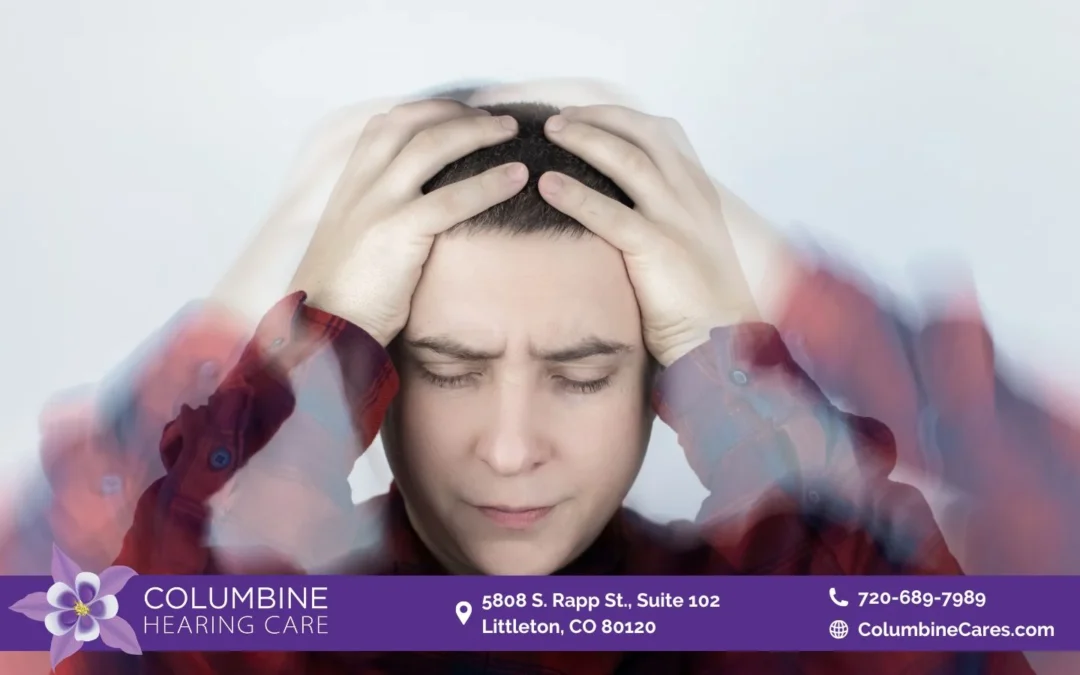Do you feel dizzy when you’re not moving much? Do you often have headaches? You might have a condition called vertigo. Let’s learn more about vertigo and how it can affect you.
What is Vertigo?
Vertigo makes you feel like you’re spinning or moving, even when you are still. This can happen because of certain medicines, problems in the inner ear, or issues with your brain. It’s not just a simple dizziness; it feels like you or your surroundings are whirling around.
Symptoms of Vertigo
The main symptoms of vertigo include:
- Feeling dizzy
- Nausea (feeling like you might throw up)
- Sweating
- Trouble walking or keeping your balance
Vertigo can be short-term or long-term, making it hard to do everyday things. It can affect anyone at any age, but it is more common in older adults.
How to Know if You Have Vertigo
The symptoms of vertigo are similar to other health problems. It’s important to see a doctor or an audiologist to determinet if you have vertigo or something else. Here are some signs of vertigo to watch for:
Feeling Like the Room is Spinning
Feeling dizzy is the most common sign of vertigo. It can last from a few minutes to several hours. This feeling can be very scary and might make you feel like you need to sit or lie down. If you feel dizzy, don’t ignore it. It could be a sign of a serious problem.
Vomiting and Nausea
Vertigo can make you feel very sick to your stomach. Some people feel like they are on a fast roller coaster. This can lead to vomiting, which is very uncomfortable. If you feel very dizzy, see a doctor. It could be dangerous because you might fall or get hurt.
Loss of Balance
When you have vertigo, you might feel unsteady. If this happens, sit down or lie down to avoid falling. Only try to walk once you feel steady again. This unsteady feeling can make it hard to do simple things like walking to the kitchen or getting dressed.
Headaches or Migraines
If you have headaches often, see a doctor. Constant headaches can be a sign of vertigo or another problem. Migraines are a type of headache that can be very painful and might come with other symptoms like sensitivity to light and sound.
Ringing in the Ears
Sometimes, vertigo comes with a ringing sound in your ears. This is called tinnitus and can happen if the vertigo is caused by an inner ear problem. Tinnitus can be annoying and make it hard to hear other sounds.
Vision Problems
Vertigo can also affect your eyes. You might see things blurry or double. This can make it hard to read, watch TV, or even see where you’re going. If this happens, it might be because of a problem with your brain or nerves.
Is Vertigo a Hearing Disorder?
Vertigo is not a hearing disorder, but it can be a symptom of an inner ear problem. The inner ear helps control balance, so if there’s an issue there, it can cause vertigo. Seeing an audiologist (a hearing specialist) can help determine the cause of vertigo. They can perform tests to check how well your inner ear is working.
How Can Audiologists Help?
Audiologists are trained to diagnose and treat vertigo, especially if it’s caused by inner ear problems. They can do tests to check your inner ear and balance system. These tests can help figure out if your vertigo is due to an inner ear issue or something else.
Depending on what’s causing your vertigo, audiologists can suggest treatments like:
- Medicine to reduce symptoms
- Exercises to improve balance
- Referrals to other specialists if needed
Treatments for Vertigo
There are different ways to treat vertigo. Here are some common treatments:
Medication
Doctors might give you medicine to help with nausea and dizziness. These medicines can make you feel better and help you go back to your normal activities.
Balance Exercises
Some exercises can help improve your balance. These exercises train your brain to use other senses to help keep you steady.
Lifestyle Changes
Changing your daily habits can sometimes help. This might include drinking less caffeine, avoiding certain movements, or getting enough rest.
Audiologists in Littleton, CO
If you think you have vertigo or other hearing problems, see an audiologist. Getting the right diagnosis can help reduce symptoms and improve your life. Audiologists are experts in diagnosing and treating conditions related to the ear and balance.
Columbine Hearing Care has audiologists who can provide hearing tests and top-quality care in Littleton, CO. They are experienced in helping people with vertigo and other hearing issues. They offer a range of services to help you feel better and improve your quality of life.

